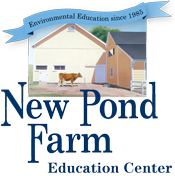by Mike Murray, Farm Manager
Manure is a valuable resource and can be quite useful in agriculture practices. A new composting shed has been built at New Pond Farm and is located behind the main farmhouse allowing further management of this important product. It was built following guidelines put in place to protect the environment, while still allowing for adequate storage and composting of the manure produced on the Farm.
This facility will allow for the creation of compost from the cow manure produced at New Pond Farm. Manure stockpiling is not the same as composting. Stockpiled manure retains odor, weed seeds and decomposes very slowly. When manure is properly composted, the weed seeds and bacteria are largely destroyed by heat, there is very little odor, and the material is changed from raw manure into a humus-like material that is stable and nutrient rich.
Manure is the product of digestion. Undigested feed material, body cells, and minerals pass through the animal and are excreted. One mature cow produces approximately 1 cubic foot of waste per day. This material is already in the beginning stages of decomposition. The decomposition (and composting) continues through management in the new manure shed. There are three bins in the new shed. Material will be added to the first bin until it is nearing capacity. Then the second bin will begin to be filled. The third bin will then serve as the location for turning the material from the first bin, and so on. Following a period of thorough composting and aging, the resulting material is then ready to be spread on the hay fields, or for use on the farm as needed.
It is important to note that only cow manure is stored in this shed. Cow manure, in comparison with manure from other farm animals, is relatively low in odor and decomposes rather quickly when composted. The bedding material from the barn serves as a source of carbon to aid in the composting process. The slanted roof protects the composting material from rain which can leach away important nutrients, and also contaminate ground water.
Additional manure management strategies are employed at New Pond Farm. One of these strategies is rotational grazing. The cows are moved out onto grass when the pastures are full of lush, green vegetation. Each pasture is divided into sections, and the cows are rotated among several areas over the course of several weeks. This allows the manure deposited there to break down, and the vegetation to recover before the cows eventually return to each section. Through successful manure management, New Pond Farm protects the environment, the health of the farm animals, and produces a useful product at the same time!

Comments are closed.